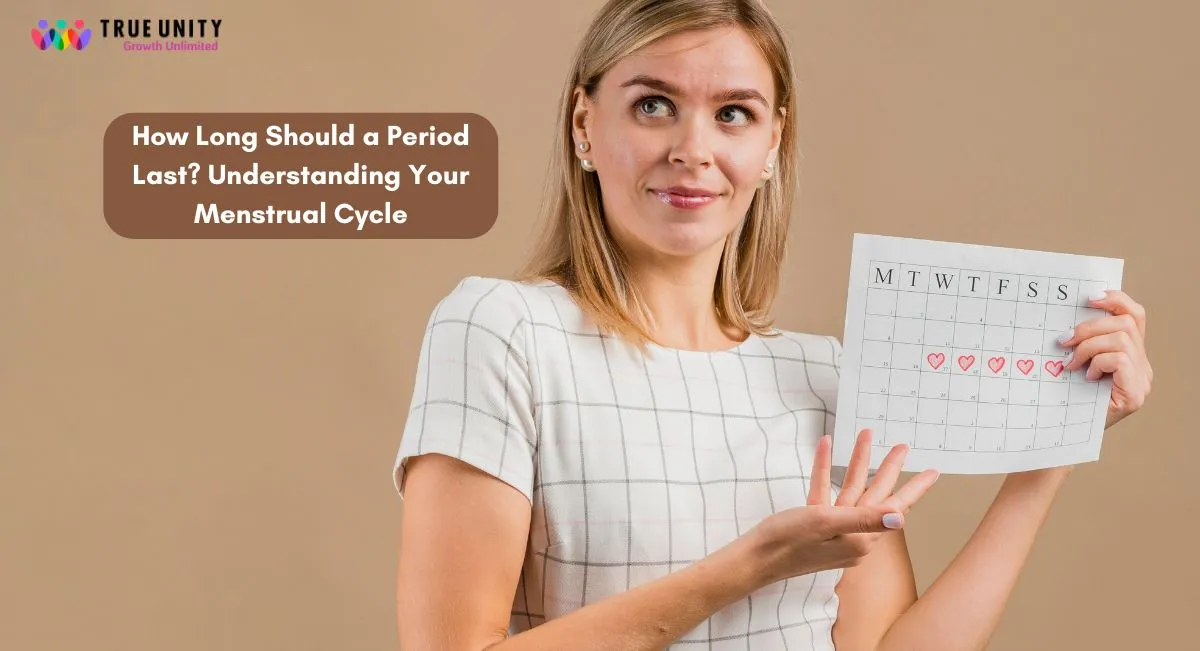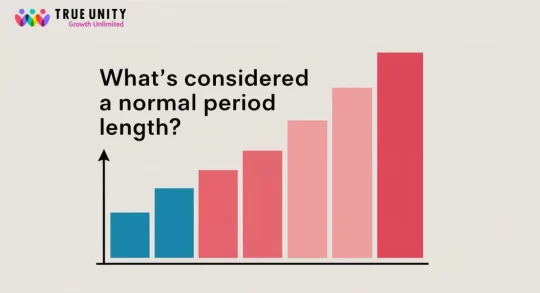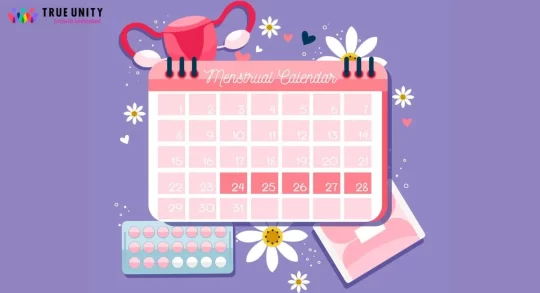Menstruation is a natural biological process that affects women of reproductive age. Many women are unsure about what is normal and what is not during their periods. A common experience for women.
In this blog, we’ll explore the typical duration of a period, the phases of the menstrual cycle, factors that can affect period length, and when to consult a doctor. We’ll also address some frequently asked questions to help you better understand your menstrual cycle.
What’s Considered a Normal Period Length?
The length of a period can vary significantly from woman to woman and even from cycle to cycle for the same individual. However, there is a range that’s generally considered normal.
Typically, a period lasts between 3 to 7 days. Some women may experience shorter periods of just 2 days, while others might have periods lasting up to 8 days. Both can be completely normal, depending on the individual.
It’s also important to remember that menstrual flow can vary throughout your period. The heaviest flow usually occurs during the first few days, gradually becoming lighter as the days progress. This is why many women find it helpful to use different types of sanitary products throughout their period, starting with more absorbent options for heavier flow and transitioning to lighter ones as needed.
If your period consistently falls within this 3 to 7 day range, doesn’t significantly impact your daily life, and your flow patterns are relatively predictable, it’s likely that your period length is normal for you. However, if you’re experiencing significant changes in your period length or flow, or if you have any concerns, it’s always a good idea to consult with a healthcare provider.
The Phases of Your Menstrual Cycle: A Breakdown
To better understand your period, it’s helpful to know about the different phases of the menstrual cycle. The average menstrual cycle lasts about 28 days, although cycles ranging from 21 to 35 days are considered normal. Here’s a breakdown of the four main phases:
- Menstrual Phase (Days 1–5): This is when you actually have your period. The uterine lining, which was built up in preparation for a potential pregnancy, is shed through the vagina. This phase typically lasts 3–7 days.
- Follicular Phase (Days 1–13): This phase overlaps with the menstrual phase. It begins on the first day of your period and ends with ovulation. During this time, the body prepares to release an egg. Follicle-stimulating hormone (FSH) stimulates the ovaries to produce follicles, one of which will mature into an egg.
- Ovulation Phase (Day 14): This is when the mature egg is released from the ovary. It typically occurs around the middle of your cycle, about 14 days before your next period starts. The egg travels down the fallopian tube, where it can be fertilized if sperm is present.
- Luteal Phase (Days 15–28): After ovulation, the ruptured follicle transforms into the corpus luteum, which produces progesterone. This hormone prepares the uterine lining for potential implantation of a fertilized egg. If pregnancy doesn’t occur, the corpus luteum degenerates, hormone levels drop, and the menstrual cycle begins again.
Understanding these phases can help you track your cycle more effectively and anticipate when your next period will start. This can be particularly helpful if you’re trying to conceive or avoid pregnancy.
Factors That Can Affect Your Period Length
Several factors can influence the length and characteristics of your period, including:
- Age: Periods can be irregular when you first start menstruating and as you approach menopause.
- Hormonal contraceptives: Birth control pills, patches, or intrauterine devices (IUDs) can affect the duration and flow of your period. Some hormonal contraceptives can even make periods lighter or less frequent.
- Stress: High levels of stress can lead to hormonal imbalances, potentially affecting your period length. Stress can sometimes cause periods to be shorter, longer, or even missed altogether.
- Diet and exercise: Extreme changes in weight or excessive exercise can disrupt your menstrual cycle. It’s important to maintain a healthy weight and engage in moderate exercise for overall well-being.
- Medical conditions: Conditions like polycystic ovary syndrome (PCOS), endometriosis, or thyroid disorders can affect your period. These conditions can cause irregular periods, heavy bleeding, or painful cramps.
- Medications: Certain medications, including blood thinners, can affect period length and flow. If you notice changes in your period after starting a new medication, consult your doctor.
- Pregnancy or breastfeeding: These can cause missed periods or changes in menstrual patterns. It’s important to be aware of these changes and discuss them with your healthcare provider.
- Uterine fibroids or polyps: These growths in the uterus can lead to heavier or longer periods, or bleeding between periods. If you suspect you have fibroids or polyps, it’s important to consult with your doctor for diagnosis and treatment.
- Other Factors: Certain medications, underlying health conditions, and even travel or major life changes can also influence your menstrual cycle.
It’s worth noting that the type of menstrual products you use, such as sanitary pads, tampons, or menstrual cups, doesn’t directly affect the length of your period. However, they can influence your comfort and how you perceive your flow. It’s essential to choose the right product for your flow and personal preferences.
When to See a Doctor About Your Period
While some variation in period length is normal, certain signs may indicate a need to consult a healthcare provider:
- Periods that consistently last longer than 7 days
- Extremely heavy flow that soaks through a pad or tampon every hour for several consecutive hours
- Periods that occur less than 21 days apart or more than 35 days apart
- Severe pain that interferes with daily activities
- Bleeding between periods
- Sudden changes in your menstrual pattern
- Absence of periods for 3 months or more (if not due to pregnancy, breastfeeding, or menopause)
These symptoms could be signs of underlying health conditions like PCOS, endometriosis, fibroids, or hormonal imbalances that require medical attention. Your doctor can perform tests to determine the cause and recommend appropriate treatment.
Frequently Asked Questions
Can Stress Really Affect My Period?
Yes, stress can indeed affect your menstrual cycle. High levels of stress can disrupt the delicate balance of hormones that regulate your cycle, potentially leading to longer or shorter periods, or even missed periods. If you’re experiencing significant stress, try relaxation techniques like yoga, meditation, or deep breathing exercises, and consider talking to a therapist or counselor.
Does using Birth Control Pills affect Period Length?
Yes, birth control pills can affect both the length and flow of your period. Many women experience shorter, lighter periods when on the pill due to the hormones it contains. Some types of birth control can even reduce the frequency of periods or stop them altogether. It’s important to discuss the potential effects of birth control on your period with your healthcare provider.
Is it Normal for Period Length to Change with Age?
Yes, it’s entirely normal for your period to change as you age. Periods can be irregular when you first start menstruating during puberty and as you approach menopause. During your 20s and 30s, your periods typically become more regular and predictable.
Can Diet Affect My Period?
While diet doesn’t directly determine the length of your period, extreme dietary changes that lead to significant weight loss or gain can disrupt your menstrual cycle. A balanced diet rich in iron, vitamin B12, and other essential nutrients supports overall hormonal health, which in turn can contribute to regular menstrual cycles.
Are Very Short Periods (1-2 days) a cause for Concern?
Not necessarily. If you’ve always had short periods and they’re regular, this may be normal for you. However, if your periods have suddenly become much shorter than usual or if you have any concerns, it’s worth discussing with your healthcare provider.
Can certain Medical Conditions cause Longer Periods?
Yes, conditions such as uterine fibroids, polyps, endometriosis, or certain hormonal imbalances can lead to longer or heavier periods. If you’re experiencing unusually long periods, it’s important to consult with a doctor to rule out any underlying medical conditions.




